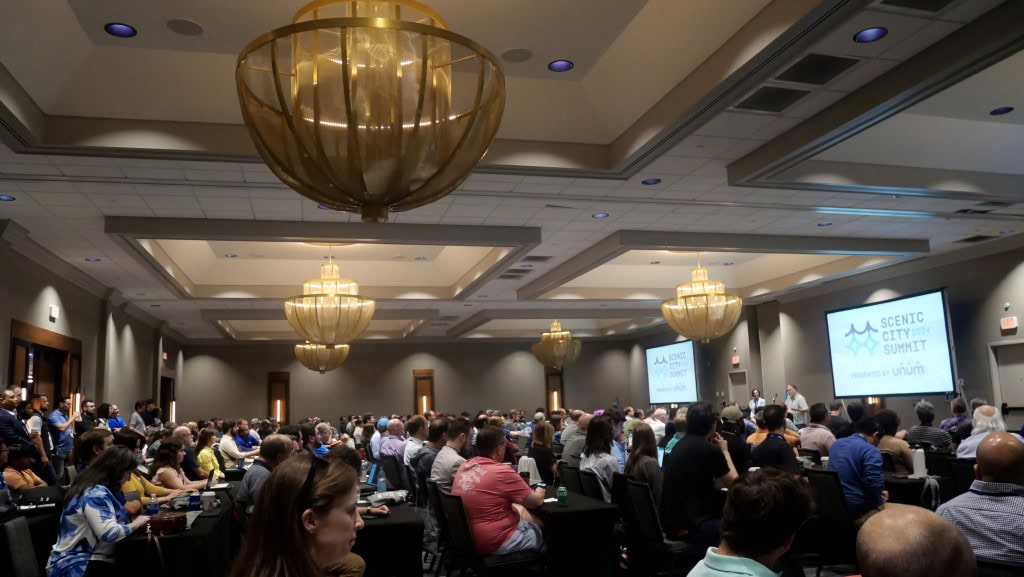In the third entry in this series, we take a turn south, not in quality, but in the geography of our next entrant. Rather our interview target is Rob Farley, who is from (well lives in) Australia.
Rob Farley is a SQL Server MVP, and is quite a busy fellow. He is the owner of a consulting company named LobsterPot Solutions, located in Adelaide, and is a current member of the PASS Board of Directors. His blog is located at SQL Blog, where I also blog, and he tweets under the extremely unobvious handle of @rob_farley. He speaks regularly at SQL PASS conference, and sang during the keynote with the one and only Buck Woody (http://blog.datainspirations.com/2011/10/14/pass-summit-2011-day-3-keynote/).
Rob has been a friend for quite a few years now, starting (in my mind) when I introduced myself to him at a conference thinking he was Arnie Rowland (yet another wonderful member of the SQL community, whom you might mistake for Rob from a hard working standpoint, but Arnie doesn’t wear glasses regularly :). As I remember the story, neither were offended, much like when people mistake me for Orson Welles, I am honored because he was such a great writer. I will note too that Rob remembered it differently, but my version makes me sound far more intelligent. Rob is a tough one too, as I once worked with him on a Microsoft Learning contract in Seattle where he had recently had his appendix out (remember where he is from… and I get kind of sore from a 4 hour flight!)
So, now that we have gotten past the silliest parts of the interview from my contributions, on to the interview questions.
——————————————
1. Think back to the moment you hit the first key, starting to write a blog, an article, a book, or whatever. What made you do it? Or perhaps, what were you expecting to achieve that was better than your previous use of free time. Have you gotten the benefit you were shooting for back then?
It was April 2005. I had been getting more and more involved in the community, attending the occasional user group, both .Net and SQL Server, and there was an all-afternoon event about SQL Server 2005 that I went along to. I’d already been thinking about getting into blogging, and a conversation with one of the evangelists from Microsoft who was at this event meant that I wrote my first blog post the next day. At the time, I just figured that it might be helpful for someone, but didn’t know who that might be. At the time, I was feeling like I needed to be stretched, and blogging gave me the chance to write about the things that I knew, and to go a little further with things than I had before. When you write things down, you find yourself wanting to make sure that it’s right – blogging gave me that then, and still does. Unfortunately, I cringe at old blog posts, as I think we all do [ed; I know I certainly do!], but I still enjoy the experience of getting content into a blog-worthy condition and publishing it for other people to read.
2. We all have influencers that have advanced our careers as writers. It may be a teacher who told you that you had great potential? Another writer who impressed you that you wanted to be like? Or perhaps on the other end of the spectrum it was a teacher who told you that you were too stupid to write well enough to spell your own name, much less have people one day impressed with your writing? Who were your influences that stand out as essential parts of your journey to the level of writer you have become?
In school I had teachers that liked my writing, and teachers that thought it was awful. From that, I managed to discover that my writing had a particular style, a ‘voice’ (accent?) that could be heard. Today I value that in my writing, and try not to let it go. The times I’ve written book chapters I’ve worried a lot about losing that style, as editors often try to avoid having that kind of thing come through. It’s probably like how I’ve a tendency to use contractions. If I couldn’t’ve ever used them, I think I’d’ve struggled to write much, as people wouldn’t hear me in what I wrote. Perhaps JD Salinger had an effect on me, as Holden Caulfield’s voice came through so much in that book.
3. Can you describe the process you go through to write (including any tools you find indispensable), from inception of an idea until it gets put out for consumption?
This depends on what kind of thing I’m writing. 🙂
I’m very big on just opening Live Writer and pouring text onto the screen. Of course I’ll need to spend time in SSMS, getting the queries right to demonstrate the technical aspects, but I like to just get the text flowing. I’m very self-critical, which means that I don’t try to think how to phrase every sentence, or use just the right simile, but rather, I try to bring the reader into what I’m writing and explain things to them. I’m currently trying to get online training sorted which I call “Train-the-Explainer”, because I want to be able to teach people things in a way that helps them really understand the concepts of what’s going on, and I try to have that same idea come out in my writing. I’m likely to end up using phrases like “You know how…, well it’s like that,” in my writing, but when it comes down to it, I want people to read it as if I’m sitting next to them, explaining things to them.
What I find really hard is writing songs or jokes. I realise that I tell jokes, even during presentations, and I wrote a comedy set for the PASS Summit in 2010 and a song for 2011, but as much as I’d like to do much more of that, I really struggle. I really want to write both, but find myself crossing things out, or finding that things really aren’t as funny (or poignant or whatever) as I’d like. A co-writer would be good – someone I could bounce things off so that they can tell me when an idea is worth pursuing, and when my ranting should be converted into an actual joke.
4. Assume a time machine has been created, and you are scheduled to speak to a group of potential writers, in which you and I are in attendance. Without concern for the temporal physics that might cause the universe to implode making the answer moot, what would you tell "past us", and do you think that your advice would change where you and I are in our careers now? (like would you tell yourself to get excited for the day you will be sitting here for a rather long period of time answering interview questions and not getting paid for it, instead of feeling the warm sun on your forehead?)
Don’t get me started on the time travel thing. I have conversations with my kids about that kind of thing, like ideas around how paradoxes could get resolved… but back to the question!
If I could choose when to go back to, I’d go back much further… to a time when I thought I wasn’t any good at writing (ok, that’s typically still the case – did I mention I’m self-deprecating?), and was choosing to pursue a computer-focused degree. I’d tell myself to really explore the things that I enjoyed, including writing, and to just get started. I could put so many things in that bracket – comedy, writing and music are some that I’ve already mentioned – but I keep finding myself way more interested in people than in technology. I enjoy teaching (adults, not kids), I enjoy ministry, I enjoy community, but my career has largely been focused on technology. I’d tell those potential writers to start doing those things which define them. Solving puzzles can be fun, but unless those puzzles are allowing you to be creative, then they may not be completely satisfying. Of course, I doubt it would make a difference. Someone who’s good at maths will see the creativity in that and still end up in IT.
5.Finally, beyond the "how" questions, now the big on. There are no doubt tremendous pulls on your time. Why do you do write?
This comes down to that last question. I write because it’s something which lets me be slightly closer to what I want to spend my time on. I’d like to be completely financially independent, and be able to spend my days helping other people with things. My career as a consultant lets me do some of that, but not in the way that I really want. Those people who ask me for help with things probably know that I quite willingly invest myself into their particular problem, and I honestly do it completely for them, because I enjoy it. Writing lets me do that in a way that means they don’t have to ask – for those people that go looking for something and stumble across it.
Finally, a bonus question I provide to let the person stretch the topic and talk about anything they want to:
1. Is there any project you would like to tell people about that we haven’t yet mentioned?
I should be better at marketing, but I’m really bad at it. I should write some stuff about how LobsterPot is a great company that you should all use to improve your data story. We can help you write better T-SQL, tune your system, get your data into a data warehouse, even present it in the amazing PivotViewer platform that we ported to HTML5 so that it runs on iPads. I should write about the Train-the-Explainer thing that I want to do, where I’ll charge people a small amount to attend an online classroom (limited sizes) to have me explain SQL stuff to them in a way that hopefully means that they can not only implement the ideas, but can actually explain it to other people. I should write about how I’m available to teach Advanced T-SQL courses, and will happily come to just about anywhere in the world to do so (although it’ll be at your expense, and it’ll have to fit into my course schedule). But I’m not good at self-promotion, so if your readers want to ask me about these things, they should probably just drop me a line and start a conversation.
…I’m always happy to talk. [ed. @rob_farley is his twitter if all else fails]
——————————————————-
I definitely want to thank Rob Farley for taking the time to answer my interview today. I got a bit more insight into how yet a third person thinks about the process and value of the writing process. His why answer reminds me of some of the reason I got started answering forum posts. I don’t always love helping individuals directly because usually when you have gone out and asked a question, you are lost and just need that straightforward how do I get out of this jam, answers. Kind of like when you go to the gas (petrol?) station and ask for directions. If they start telling you how you should have planned ahead, while it is good advice, it can tick you off. The only person who is apt to learn a lesson there is a bystander who hears the answer. Since they aren’t lost, hearing how to ever avoid being lost may be useful. When writing. I always try to help with the immediate need first: “the bakery is a block that way”, and then “the app you have on that phone I see will tell you how to get there if you are ever lost again”. They might not care, but the next reader might.
Still not the answer I would give to the time machine question (other than the paradox stuff!), but I love Rob’s answer.
The next entry will be Doug Lane, who works in BI. He will be speaking at the PASS BA Conference this week (4/10-12, 2013; so don’t go there if this is 2020 when you are reading this and blame me), so feel free to suggest answers for him if you see him there!





Load comments